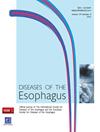741. EXPRESSION OF COX2 AND P53 IN RAT ESOPHAGEAL CANCER INDUCED BY REFLUX OF DUODENAL CONTENTS
IF 2.3
3区 医学
Q3 GASTROENTEROLOGY & HEPATOLOGY
引用次数: 0
Abstract
Aim. Reflux of duodenal contents can induce mucosal injury, stimulate cell proliferation, and promote tumorigenesis. We examined the expression of COX2 and p53 in rat esophageal lesions induced by duodenal content reflux. Methods. Thirty 8-week-old male Wistar rats were exposed to duodenal content esophageal reflux. All animals underwent an esophagoduodenal anastomosis (EDA) with total gastrectomy in order to produce chronic esophagitis. Ten rats were the sham. Control. They were sacrificed at the 40th week. Their esophagi were examined for HE, COX2, p53, and proliferating cell nuclear antigen (PCNA). Results. After 40 weeks of reflux, dysplasia, squamous cell carcinoma (SCC), and adenocarcinoma (ADC) were found. PCNA labeling index was higher in dysplastic and cancer tissue than that in normal. Overexpression of COX2 was shown in ADC and SCC. Wild-type p53 accumulation was found in ADC, and not in SCC. Conclusion. Reflux of duodenal contents into the esophagus led to ADC and SCC in rats. COX2 may play an important role in esophageal cancer by duodenal content reflux. Our present results suggest an association between wild-type p53 accumulation and COX2 expression in ADC, with no such relation seen in SCC.741.十二指肠内容物反流诱发的大鼠食管癌中 COX2 和 P53 的表达
目的。十二指肠内容物反流可诱发粘膜损伤、刺激细胞增殖并促进肿瘤发生。我们研究了十二指肠内容物反流诱导的大鼠食管病变中 COX2 和 p53 的表达。研究方法将 30 只 8 周大的雄性 Wistar 大鼠暴露于十二指肠内容物食管反流。所有动物都接受了食管十二指肠吻合术(EDA)和全胃切除术,以产生慢性食管炎。十只大鼠为假对照组它们在第 40 周时被处死。对它们的食管进行 HE、COX2、p53 和增殖细胞核抗原 (PCNA) 检测。结果反流 40 周后,发现了发育不良、鳞状细胞癌(SCC)和腺癌(ADC)。发育不良和癌组织的 PCNA 标记指数高于正常组织。ADC 和 SCC 中 COX2 表达过高。在 ADC 中发现了野生型 p53 的积累,而在 SCC 中则没有发现。结论十二指肠内容物反流入食管导致大鼠患上 ADC 和 SCC。COX2 可能在十二指肠内容物反流导致食管癌的过程中扮演重要角色。我们目前的研究结果表明,在 ADC 中,野生型 p53 的积累与 COX2 的表达有关,而在 SCC 中则没有这种关系。
本文章由计算机程序翻译,如有差异,请以英文原文为准。
求助全文
约1分钟内获得全文
求助全文
来源期刊

Diseases of the Esophagus
医学-胃肠肝病学
CiteScore
5.30
自引率
7.70%
发文量
568
审稿时长
6 months
期刊介绍:
Diseases of the Esophagus covers all aspects of the esophagus - etiology, investigation and diagnosis, and both medical and surgical treatment.
 求助内容:
求助内容: 应助结果提醒方式:
应助结果提醒方式:


